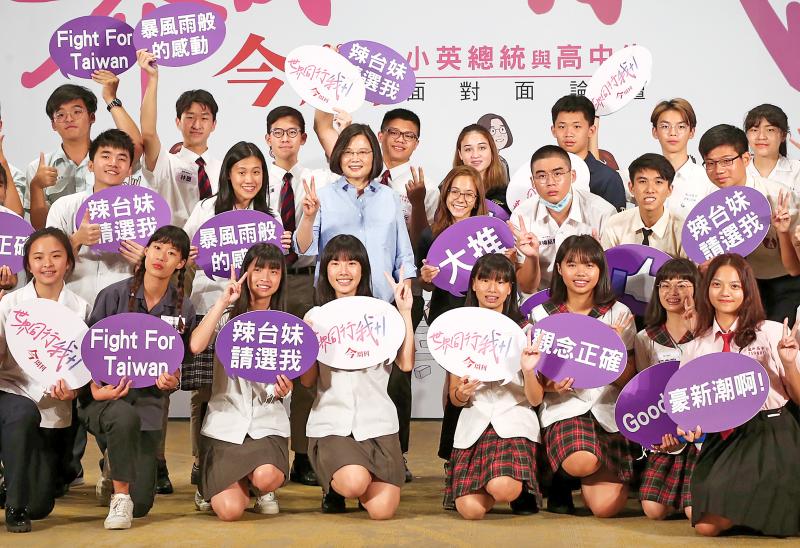Senior and vocational high-school students from across the nation yesterday joined President Tsai Ing-wen (蔡英文) at an annual forum in Taipei discussing topics ranging from student opportunities to the nation’s international presence.
The theme of this year’s event, hosted since 2016 by the Chinese-language Business Today, was “One With the World.”
In her opening remarks, Tsai outlined the success of the nation’s efforts to contain the spread of COVID-19.

Photo: CNA
By planning ahead, and with the cooperation of the public and the use of technology, Taiwan has attracted the attention of many people worldwide, she said.
The nation has not only managed to handle the domestic situation well, but was also able to offer assistance to other nations in need, she said, adding that the COVID-19 pandemic has demonstrated to the world that “Taiwan can help” and “Taiwan is helping.”
More opportunities would arise for the nation to show its capability and willingness to stand with the world, Tsai added.
She urged students to imagine themselves as decisionmakers, and consider how they would respond to various problems.
At the forum, groups of students representing different high schools were invited to present their ideas and pose questions to the president.
During their presentation, three students from Myanmar studying at New Taipei City’s Juang Jing Vocational High School said that they hoped to work in Taiwan after completing their studies under the government’s “three plus four” Vocational Education Program for Overseas Compatriot Students.
They asked Tsai whether overseas compatriot students like themselves would be able to apply for permanent residency and entrepreneurship funds that are made available to young Taiwanese.
Praising the students’ courage in overcoming language and cultural barriers to study in Taiwan, Tsai said that a draft economic immigration act pending review by the Legislative Yuan would give foreign students the opportunity to stay in the nation.
She told the students that as long as they are in Taiwan, the government would offer them the same support it gives local students.
Students from Taipei American School (TAS) drew from their school’s experience in participating in international competitions, such as the FIRST Robotics Competition, and encouraged local schools to do the same.
“It is clear that we are … strong in our ability, but if we are able to invest more resources into allowing more opportunity for younger students to attend conferences or festivals such as these, then we can really introduce the idea of becoming global citizens,” TAS student Julianne Vaughan said.
Students from Taichung’s Cingshuei Senior High School raised concerns about encroachment on the nation’s sovereignty, citing as an example the latest territorial dispute with Japan over the Diaoyutais (釣魚台).
Tsai said that while Taiwan is restricted by historical factors and realities, Taiwanese must speak with one voice when they express to the world their values, views and determination.
Educational inequality, bilingual education and student representation at school affairs meetings were among the other topics discussed at the forum.
Organizers said that 56 schools signed up to participate in the forum this year, and 30 student representatives from 10 schools were invited to attend.

The Grand Hotel Taipei on Saturday confirmed that its information system had been illegally accessed and expressed its deepest apologies for the concern it has caused its customers, adding that the issue is being investigated by the Ministry of Justice Investigation Bureau. The hotel said that on Tuesday last week, it had discovered an external illegal intrusion into its information system. An initial digital forensic investigation confirmed that parts of the system had been accessed, it said, adding that the possibility that some customer data were stolen and leaked could not be ruled out. The actual scope and content of the affected data

‘LIKE-MINDED PARTNER’: Tako van Popta said it would be inappropriate to delay signing the deal with Taiwan because of China, adding he would promote the issue Canadian senators have stressed Taiwan’s importance for international trade and expressed enthusiasm for ensuring the Taiwan-Canada trade cooperation framework agreement is implemented this year. Representative to Canada Harry Tseng (曾厚仁) in an interview with the Central News Agency (CNA) said he was increasingly uneasy about Ottawa’s delays in signing the agreement, especially as Ottawa has warmed toward Beijing. There are “no negotiations left. Not only [is it] initialed, we have three versions of the text ready: English, French and Mandarin,” Tseng said. “That tells you how close we are to the final signature.” Tseng said that he hoped Canadian Prime Minister Mark Carney

President William Lai (賴清德) yesterday bestowed one of Taiwan’s highest honors on Saint Vincent and the Grenadines (SVG) Ambassador Andrea Clare Bowman in recognition of her contributions to bilateral ties. “By conferring the Order of Brilliant Star with Grand Cordon on Ambassador Bowman today, I want to sincerely thank her, on behalf of the Taiwanese people, for her outstanding contribution to deepening diplomatic ties between Taiwan and SVG,” Lai said at a ceremony held at the Presidential Office in Taipei. He noted that Bowman became SVG’s first ambassador to Taiwan in 2019 and

POSITIVE DEVELOPMENT: Japan and the US are expected to hold in-depth discussions on Taiwan-related issues during the meeting next month, Japanese sources said The holding of a Japan-US leaders’ meeting ahead of US President Donald Trump’s visit to China is positive news for Taiwan, former Japan-Taiwan Exchange Association representative Hiroyasu Izumi said yesterday. After the Liberal Democratic Party’s landslide victory in Japan’s House of Representatives election, Japanese Prime Minister Sanae Takaichi is scheduled to visit the US next month, where she is to meet with Trump ahead of the US president’s planned visit to China from March 31 to April 2 for a meeting with Chinese President Xi Jinping (習近平). Japan and the US are expected to hold in-depth discussions on Taiwan-related issues during the